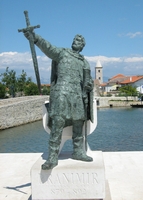Muska sovinisticka svinja
Page 5 of 19
Page 5 of 19 •  1, 2, 3, 4, 5, 6 ... 12 ... 19
1, 2, 3, 4, 5, 6 ... 12 ... 19 
 Re: Muska sovinisticka svinja
Re: Muska sovinisticka svinja
Jbga...postalo je nužno.veber wrote:jebalo vas prebrojavanje krvnih zrnaca.
Svaki period kad se zanemarilo to prebrojavanje u konačnici je završio ratom i masovnim čistkama. Prebrojavati i sortirati treba konstantno da ne dođe do većih pizdarija.
Uvijek je bilo " Bolje spriječiti nego liječiti ".
danni1- Posts : 5159
2014-04-16
 Re: Muska sovinisticka svinja
Re: Muska sovinisticka svinja
Lažu!kaja wrote:ručala sam, hvala.veber wrote:kajo, draga moja, svjetlost je dualna i ako je nešto teorija ne znači da je to fakt.kaja wrote:jojj veber, nije za sada međutim stalno pišu da su u CERNU otkrili čestice brže od svjetlosti a to bi mu je moglo uzdrmati jer se po njemu najbrže kreće čestica svjetlost a što mu je ključni dio teorije..
svjetlost je val i čestica.
ali ne bumo o fizici, ajmo o nekom ručkiću?
'
tako piše, ja samo prenosim, da su otkrili čestice još brže od svjetlosti
_________________


danni1-

Posts : 5159
2014-04-16
Age : 53
Lokacija: : Dugo Selo
 Re: Muska sovinisticka svinja
Re: Muska sovinisticka svinja
pedala na finjakaručala sam, hvala.

'tako piše, ja samo prenosim, da su otkrili čestice još brže od svjetlosti
još je teorija
_________________
AfD

veber-

Posts : 53509
2014-12-30
 Re: Muska sovinisticka svinja
Re: Muska sovinisticka svinja
Ma jok, ništa od toga. Inače Einstein je naveo kako ništa s masom ne može dosegnuti brzinu svjetlosti. Fotoni naime nemaju masu.kaja wrote:
tako piše, ja samo prenosim, da su otkrili čestice još brže od svjetlosti

Brain32-

Posts : 1394
2014-04-15
 Re: Muska sovinisticka svinja
Re: Muska sovinisticka svinja
Albert je jos i dobar, za Teslu zene su bile 


dijagram-

Posts : 18912
2015-08-09
 Re: Muska sovinisticka svinja
Re: Muska sovinisticka svinja
uopće nije bitno da li je ili nije konstanta.Brain32 wrote:Ma jok, ništa od toga. Inače Einstein je naveo kako ništa s masom ne može dosegnuti brzinu svjetlosti. Fotoni naime nemaju masu.kaja wrote:
tako piše, ja samo prenosim, da su otkrili čestice još brže od svjetlosti
znamo da je gravitacija najjača sila koju poznajemo.
i zato se rade experimenti crvotočina.
_________________
AfD

veber-

Posts : 53509
2014-12-30
 Re: Muska sovinisticka svinja
Re: Muska sovinisticka svinja
još ćemo i za njega otkriti da mu je neka napisala formule:)dijagram wrote:Albert je jos i dobar, za Teslu zene su bile

kaya- Posts : 31419
2015-08-15
 Re: Muska sovinisticka svinja
Re: Muska sovinisticka svinja
i meni zena sve izracuna, ja delam,crncim ,a onda ona izracuna kako to potrositikaja wrote:još ćemo i za njega otkriti da mu je neka napisala formule:)dijagram wrote:Albert je jos i dobar, za Teslu zene su bile

dijagram-

Posts : 18912
2015-08-09
 Re: Muska sovinisticka svinja
Re: Muska sovinisticka svinja
žene pišu formule.kaja wrote:još ćemo i za njega otkriti da mu je neka napisala formule:)dijagram wrote:Albert je jos i dobar, za Teslu zene su bile
koje se baš ne sviđaju muškarcima

_________________
AfD

veber-

Posts : 53509
2014-12-30
 Re: Muska sovinisticka svinja
Re: Muska sovinisticka svinja
kolega, da bi reč rekel.dijagram wrote:i meni zena sve izracuna, ja delam,crncim ,a onda ona izracuna kako to potrositikaja wrote:još ćemo i za njega otkriti da mu je neka napisala formule:)dijagram wrote:Albert je jos i dobar, za Teslu zene su bile
_________________
AfD

veber-

Posts : 53509
2014-12-30
 Re: Muska sovinisticka svinja
Re: Muska sovinisticka svinja
srecom skrijem koju kovanicu za kakvu lavazzu:)veber wrote:kolega, da bi reč rekel.dijagram wrote:i meni zena sve izracuna, ja delam,crncim ,a onda ona izracuna kako to potrositikaja wrote:još ćemo i za njega otkriti da mu je neka napisala formule:)dijagram wrote:Albert je jos i dobar, za Teslu zene su bile

dijagram-

Posts : 18912
2015-08-09
 Re: Muska sovinisticka svinja
Re: Muska sovinisticka svinja
nekoliko primjera:
Jocelyn Bell Burnell
Born in Northern Ireland in 1943, Jocelyn Bell Burnell discovered pulsars in 1967 while still a graduate student in radio astronomy at Cambridge University in England.
Pulsars are the remnants of massive stars that went supernova. Their very existence demonstrates that these giants didn't blow themselves into oblivion—instead, they left behind small, incredibly dense, rotating stars.
Bell Burnell discovered the recurring signals given off by their rotation while analyzing data printed out on three miles of paper from a radio telescope she helped assemble.
The finding resulted in a Nobel Prize, but the 1974 award in physics went to Anthony Hewish—Bell Burnell's supervisor—and Martin Ryle, also a radio astronomer at Cambridge University.
The snub generated a "wave of sympathy" for Bell Burnell. But in an interview with National Geographic News this month, the astronomer was fairly matter-of-fact.
"The picture people had at the time of the way that science was done was that there was a senior man—and it was always a man—who had under him a whole load of minions, junior staff, who weren't expected to think, who were only expected to do as he said," explained Bell Burnell, now a visiting astronomy professor at the University of Oxford.
But despite the sympathy, and her groundbreaking work, Bell Burnell said she was still subject to the prevailing attitudes toward women in academia.
"I didn't always have research jobs," she said. Many of the positions the astrophysicist was offered in her career were focused on teaching or administrative and management duties.
"[And] it was extremely hard combining family and career," Bell Burnell said, partly because the university where she worked while pregnant had no provisions for maternity leave.
She has since become quite "protective" of women in academia. Some individual schools may give them support, but Bell Burnell wants a systemic approach to boost the numbers of female researchers.
She recently chaired a working group for the Royal Society of Edinburgh, tasked with finding a strategy to boost the number of women in the fields of science, technology, engineering, and math in Scotland. (Learn more about Bell Burnell.)
Esther Lederberg
Born in 1922 in the Bronx, Esther Lederberg would grow up to lay the groundwork for future discoveries on genetic inheritance in bacteria, gene regulation, and genetic recombination.
A microbiologist, she is perhaps best known for discovering a virus that infects bacteria—called the lambda bacteriophage—in 1951, while at the University of Wisconsin.
Lederberg, along with her first husband Joshua Lederberg, also developed a way to easily transfer bacterial colonies from one petri dish to another, called replica plating, which enabled the study of antibiotic resistance. The Lederberg method is still in use today.
Joshua Lederberg's work on replica plating played a part in his 1958 Nobel Prize for physiology or medicine, which he shared with George Beadle and Edward Tatum.
"She deserved credit for the discovery of lambda phage, her work on the F fertility factor, and, especially, replica plating," wrote Stanley Falkow, a retired microbiologist at Stanford University, in an email. But she didn't receive it.
Lederberg also wasn't treated fairly in terms of her academic standing at Stanford, added Falkow, a colleague of Lederberg's who spoke at her memorial service in 2006. "She had to fight just to be appointed as a research associate professor, whereas she surely should have been afforded full professorial rank. She was not alone. Women were treated badly in academia in those days."
Chien-Shiung Wu
Born in Liu Ho, China, in 1912, Chien-Shiung Wu overturned a law of physics and participated in the development of the atom bomb.
Wu was recruited to Columbia University in the 1940s as part of the Manhattan Project and conducted research on radiation detection and uranium enrichment. She stayed in the United States after the war and became known as one of the best experimental physicists of her time, said Nina Byers, a retired physics professor at the University of California, Los Angeles.
In the mid-1950s, two theoretical physicists, Tsung-Dao Lee and Chen Ning Yang, approached Wu to help disprove the law of parity. The law holds that in quantum mechanics, two physical systems—like atoms—that were mirror images would behave in identical ways.
Wu's experiments using cobalt-60, a radioactive form of the cobalt metal, upended this law, which had been accepted for 30 years.
This milestone in physics led to a 1957 Nobel Prize for Yang and Lee—but not for Wu, who was left out despite her critical role. "People found [the Nobel decision] outrageous," said Byers.
Pnina Abir-Am, a historian of science at Brandeis University, agreed, adding that ethnicity also played a role.
Wu died of a stroke in 1997 in New York.
Lise Meitner
Born in Vienna, Austria, in 1878, Lise Meitner's work in nuclear physics led to the discovery of nuclear fission—the fact that atomic nuclei can split in two. That finding laid the groundwork for the atomic bomb.
Her story is a complicated tangle of sexism, politics, and ethnicity.
After finishing her doctoral degree in physics at the University of Vienna, Meitner moved to Berlin in 1907 and started collaborating with chemist Otto Hahn. They maintained their working relationship for more than 30 years.
After the Nazis annexed Austria in March 1938, Meitner, who was Jewish, made her way to Stockholm, Sweden. She continued to work with Hahn, corresponding and meeting secretly in Copenhagen in November of that year.
Although Hahn performed the experiments that produced the evidence supporting the idea of nuclear fission, he was unable to come up with an explanation. Meitner and her nephew, Otto Frisch, came up with the theory.
Hahn published their findings without including Meitner as a co-author, although several accounts say Meitner understood this omission, given the situation in Nazi Germany.
"That's the start of how Meitner got separated from the credit of discovering nuclear fission," said Lewin Sime, who wrote a biography of Meitner.
The other contributing factor to the neglect of Meitner's work was her gender. Meitner once wrote to a friend that it was almost a crime to be a woman in Sweden. A researcher on the Nobel physics committee actively tried to shut her out. So Hahn alone won the 1944 Nobel Prize in chemistry for his contributions to splitting the atom.
"Meitner's colleagues at the time, including physicist Niels Bohr, absolutely felt she was instrumental in the discovery of nuclear fission," Sime said. But since her name wasn't on that initial paper with Hahn—and she was left off the Nobel Prize recognizing the discovery—over the years, she has not been associated with the finding.
The nuclear physicist died in 1968 in Cambridge, England. (Learn more about Meitner's career.)
Rosalind Franklin
Born in 1920 in London, Rosalind Franklin used x-rays to take a picture of DNA that would change biology.
Hers is perhaps one of the most well-known—and shameful—instances of a researcher being robbed of credit, said Lewin Sime.
Franklin graduated with a doctorate in physical chemistry from Cambridge University in 1945, then spent three years at an institute in Paris where she learned x-ray diffraction techniques, or the ability to determine the molecular structures of crystals. (Learn more about her education and qualifications.)
She returned to England in 1951 as a research associate in John Randall's laboratory at King's College in London and soon encountered Maurice Wilkins, who was leading his own research group studying the structure of DNA.
Franklin and Wilkins worked on separate DNA projects, but by some accounts, Wilkins mistook Franklin's role in Randall's lab as that of an assistant rather than head of her own project.
Meanwhile, James Watson and Francis Crick, both at Cambridge University, were also trying to determine the structure of DNA. They communicated with Wilkins, who at some point showed them Franklin's image of DNA—known as Photo 51—without her knowledge.
Photo 51 enabled Watson, Crick, and Wilkins to deduce the correct structure for DNA, which they published in a series of articles in the journal Nature in April 1953. Franklin also published in the same issue, providing further details on DNA's structure.
Franklin's image of the DNA molecule was key to deciphering its structure, but only Watson, Crick, and Wilkins received the 1962 Nobel Prize in physiology or medicine for their work.
Franklin died of ovarian cancer in 1958 in London, four years before Watson, Crick, and Wilkins received the Nobel. Since Nobel prizes aren't awarded posthumously, we'll never know whether Franklin would have received a share in the prize for her work. (Learn more about Franklin and Photo 51.)
Nettie Stevens
Born in 1861 in Vermont, Nettie Stevens performed studies crucial in determining that an organism's sex was dictated by its chromosomes rather than environmental or other factors.
After receiving her doctorate from Bryn Mawr College in Pennsylvania, Stevens continued at the college as a researcher studying sex determination.
By working on mealworms, she was able to deduce that the males produced sperm with X and Y chromosomes—the sex chromosomes—and that females produced reproductive cells with only X chromosomes. This was evidence supporting the theory that sex determination is directed by an organism's genetics.
A fellow researcher, named Edmund Wilson, is said to have done similar work, but came to the same conclusion later than Stevens did.
Stevens fell victim to a phenomenon known as the Matilda Effect—the repression or denial of the contributions of female researchers to science.
Thomas Hunt Morgan, a prominent geneticist at the time, is often credited with discovering the genetic basis for sex determination, said Pomona College's Hoopes. He was the first to write a genetics textbook, she noted, and he wanted to magnify his contributions.
"Textbooks have this terrible tendency to choose the same evidence as other textbooks," she added. And so Stevens' name was not associated with the discovery of sex determination.
Hoopes has no doubt that Morgan was indebted to Stevens. "He corresponded with other scientists at the time about his theories," she said. "[But] his letters back and forth with Nettie Stevens were not like that. He was asking her for details of her experiments."
"When she died [of breast cancer in 1912], he wrote about her in Science, [and] he wrote that he thought she didn't have a broad view of science," said Hoopes. "But that's because he didn't ask her."
And now we'd like to ask: Who would you add to this list of female researchers who did not get the credit they deserved for their work?
Jocelyn Bell Burnell
Born in Northern Ireland in 1943, Jocelyn Bell Burnell discovered pulsars in 1967 while still a graduate student in radio astronomy at Cambridge University in England.
Pulsars are the remnants of massive stars that went supernova. Their very existence demonstrates that these giants didn't blow themselves into oblivion—instead, they left behind small, incredibly dense, rotating stars.
Bell Burnell discovered the recurring signals given off by their rotation while analyzing data printed out on three miles of paper from a radio telescope she helped assemble.
The finding resulted in a Nobel Prize, but the 1974 award in physics went to Anthony Hewish—Bell Burnell's supervisor—and Martin Ryle, also a radio astronomer at Cambridge University.
The snub generated a "wave of sympathy" for Bell Burnell. But in an interview with National Geographic News this month, the astronomer was fairly matter-of-fact.
"The picture people had at the time of the way that science was done was that there was a senior man—and it was always a man—who had under him a whole load of minions, junior staff, who weren't expected to think, who were only expected to do as he said," explained Bell Burnell, now a visiting astronomy professor at the University of Oxford.
But despite the sympathy, and her groundbreaking work, Bell Burnell said she was still subject to the prevailing attitudes toward women in academia.
"I didn't always have research jobs," she said. Many of the positions the astrophysicist was offered in her career were focused on teaching or administrative and management duties.
"[And] it was extremely hard combining family and career," Bell Burnell said, partly because the university where she worked while pregnant had no provisions for maternity leave.
She has since become quite "protective" of women in academia. Some individual schools may give them support, but Bell Burnell wants a systemic approach to boost the numbers of female researchers.
She recently chaired a working group for the Royal Society of Edinburgh, tasked with finding a strategy to boost the number of women in the fields of science, technology, engineering, and math in Scotland. (Learn more about Bell Burnell.)
Esther Lederberg
Born in 1922 in the Bronx, Esther Lederberg would grow up to lay the groundwork for future discoveries on genetic inheritance in bacteria, gene regulation, and genetic recombination.
A microbiologist, she is perhaps best known for discovering a virus that infects bacteria—called the lambda bacteriophage—in 1951, while at the University of Wisconsin.
Lederberg, along with her first husband Joshua Lederberg, also developed a way to easily transfer bacterial colonies from one petri dish to another, called replica plating, which enabled the study of antibiotic resistance. The Lederberg method is still in use today.
Joshua Lederberg's work on replica plating played a part in his 1958 Nobel Prize for physiology or medicine, which he shared with George Beadle and Edward Tatum.
"She deserved credit for the discovery of lambda phage, her work on the F fertility factor, and, especially, replica plating," wrote Stanley Falkow, a retired microbiologist at Stanford University, in an email. But she didn't receive it.
Lederberg also wasn't treated fairly in terms of her academic standing at Stanford, added Falkow, a colleague of Lederberg's who spoke at her memorial service in 2006. "She had to fight just to be appointed as a research associate professor, whereas she surely should have been afforded full professorial rank. She was not alone. Women were treated badly in academia in those days."
Chien-Shiung Wu
Born in Liu Ho, China, in 1912, Chien-Shiung Wu overturned a law of physics and participated in the development of the atom bomb.
Wu was recruited to Columbia University in the 1940s as part of the Manhattan Project and conducted research on radiation detection and uranium enrichment. She stayed in the United States after the war and became known as one of the best experimental physicists of her time, said Nina Byers, a retired physics professor at the University of California, Los Angeles.
In the mid-1950s, two theoretical physicists, Tsung-Dao Lee and Chen Ning Yang, approached Wu to help disprove the law of parity. The law holds that in quantum mechanics, two physical systems—like atoms—that were mirror images would behave in identical ways.
Wu's experiments using cobalt-60, a radioactive form of the cobalt metal, upended this law, which had been accepted for 30 years.
This milestone in physics led to a 1957 Nobel Prize for Yang and Lee—but not for Wu, who was left out despite her critical role. "People found [the Nobel decision] outrageous," said Byers.
Pnina Abir-Am, a historian of science at Brandeis University, agreed, adding that ethnicity also played a role.
Wu died of a stroke in 1997 in New York.
Lise Meitner
Born in Vienna, Austria, in 1878, Lise Meitner's work in nuclear physics led to the discovery of nuclear fission—the fact that atomic nuclei can split in two. That finding laid the groundwork for the atomic bomb.
Her story is a complicated tangle of sexism, politics, and ethnicity.
After finishing her doctoral degree in physics at the University of Vienna, Meitner moved to Berlin in 1907 and started collaborating with chemist Otto Hahn. They maintained their working relationship for more than 30 years.
After the Nazis annexed Austria in March 1938, Meitner, who was Jewish, made her way to Stockholm, Sweden. She continued to work with Hahn, corresponding and meeting secretly in Copenhagen in November of that year.
Although Hahn performed the experiments that produced the evidence supporting the idea of nuclear fission, he was unable to come up with an explanation. Meitner and her nephew, Otto Frisch, came up with the theory.
Hahn published their findings without including Meitner as a co-author, although several accounts say Meitner understood this omission, given the situation in Nazi Germany.
"That's the start of how Meitner got separated from the credit of discovering nuclear fission," said Lewin Sime, who wrote a biography of Meitner.
The other contributing factor to the neglect of Meitner's work was her gender. Meitner once wrote to a friend that it was almost a crime to be a woman in Sweden. A researcher on the Nobel physics committee actively tried to shut her out. So Hahn alone won the 1944 Nobel Prize in chemistry for his contributions to splitting the atom.
"Meitner's colleagues at the time, including physicist Niels Bohr, absolutely felt she was instrumental in the discovery of nuclear fission," Sime said. But since her name wasn't on that initial paper with Hahn—and she was left off the Nobel Prize recognizing the discovery—over the years, she has not been associated with the finding.
The nuclear physicist died in 1968 in Cambridge, England. (Learn more about Meitner's career.)
Rosalind Franklin
Born in 1920 in London, Rosalind Franklin used x-rays to take a picture of DNA that would change biology.
Hers is perhaps one of the most well-known—and shameful—instances of a researcher being robbed of credit, said Lewin Sime.
Franklin graduated with a doctorate in physical chemistry from Cambridge University in 1945, then spent three years at an institute in Paris where she learned x-ray diffraction techniques, or the ability to determine the molecular structures of crystals. (Learn more about her education and qualifications.)
She returned to England in 1951 as a research associate in John Randall's laboratory at King's College in London and soon encountered Maurice Wilkins, who was leading his own research group studying the structure of DNA.
Franklin and Wilkins worked on separate DNA projects, but by some accounts, Wilkins mistook Franklin's role in Randall's lab as that of an assistant rather than head of her own project.
Meanwhile, James Watson and Francis Crick, both at Cambridge University, were also trying to determine the structure of DNA. They communicated with Wilkins, who at some point showed them Franklin's image of DNA—known as Photo 51—without her knowledge.
Photo 51 enabled Watson, Crick, and Wilkins to deduce the correct structure for DNA, which they published in a series of articles in the journal Nature in April 1953. Franklin also published in the same issue, providing further details on DNA's structure.
Franklin's image of the DNA molecule was key to deciphering its structure, but only Watson, Crick, and Wilkins received the 1962 Nobel Prize in physiology or medicine for their work.
Franklin died of ovarian cancer in 1958 in London, four years before Watson, Crick, and Wilkins received the Nobel. Since Nobel prizes aren't awarded posthumously, we'll never know whether Franklin would have received a share in the prize for her work. (Learn more about Franklin and Photo 51.)
Nettie Stevens
Born in 1861 in Vermont, Nettie Stevens performed studies crucial in determining that an organism's sex was dictated by its chromosomes rather than environmental or other factors.
After receiving her doctorate from Bryn Mawr College in Pennsylvania, Stevens continued at the college as a researcher studying sex determination.
By working on mealworms, she was able to deduce that the males produced sperm with X and Y chromosomes—the sex chromosomes—and that females produced reproductive cells with only X chromosomes. This was evidence supporting the theory that sex determination is directed by an organism's genetics.
A fellow researcher, named Edmund Wilson, is said to have done similar work, but came to the same conclusion later than Stevens did.
Stevens fell victim to a phenomenon known as the Matilda Effect—the repression or denial of the contributions of female researchers to science.
Thomas Hunt Morgan, a prominent geneticist at the time, is often credited with discovering the genetic basis for sex determination, said Pomona College's Hoopes. He was the first to write a genetics textbook, she noted, and he wanted to magnify his contributions.
"Textbooks have this terrible tendency to choose the same evidence as other textbooks," she added. And so Stevens' name was not associated with the discovery of sex determination.
Hoopes has no doubt that Morgan was indebted to Stevens. "He corresponded with other scientists at the time about his theories," she said. "[But] his letters back and forth with Nettie Stevens were not like that. He was asking her for details of her experiments."
"When she died [of breast cancer in 1912], he wrote about her in Science, [and] he wrote that he thought she didn't have a broad view of science," said Hoopes. "But that's because he didn't ask her."
And now we'd like to ask: Who would you add to this list of female researchers who did not get the credit they deserved for their work?

Guest- Guest
 Re: Muska sovinisticka svinja
Re: Muska sovinisticka svinja
veber wrote:znamo da je gravitacija najjača sila koju poznajemo.
Gravitacija je najslabija od 4 osnovne sile svemira.

Guest- Guest
 Re: Muska sovinisticka svinja
Re: Muska sovinisticka svinja
nije bolan najjaca, gravitacija je slaba sila ali djeluje na velike udaljenostiveber wrote:uopće nije bitno da li je ili nije konstanta.Brain32 wrote:Ma jok, ništa od toga. Inače Einstein je naveo kako ništa s masom ne može dosegnuti brzinu svjetlosti. Fotoni naime nemaju masu.kaja wrote:
tako piše, ja samo prenosim, da su otkrili čestice još brže od svjetlosti
znamo da je gravitacija najjača sila koju poznajemo.
i zato se rade experimenti crvotočina.
a svjetlost je do sad najbrza tako da albert stoji
_________________
It was always the women, and above all the young ones, who were the most bigotet adherents of the party, the swallowers of slogans, the amateur spies and nosers-out of unortodoxy.
Orwell 1984

prckov- Posts : 34555
2014-04-19
 Re: Muska sovinisticka svinja
Re: Muska sovinisticka svinja
kaja wrote:za razliku od ovog majmuna alberta koji je skrivao izvor genijalnosti, milevu. i ono što je sam osmislio je zabrljao kažu u zadnje vrijeme. navodno da nije baš točno.
Mileva nije bila izvor njegove genijalnosti. On jeste sam po sebi bio genijalan, no kvaka je u tome da je imao problema s matematikom, a ona je bila vrsna matematičarka.
Da, puno toga je zabrljao, ponajprije u vezi kvantne fizike, no, za puno toga što je zabrljao je kasnije i priznao da je zabrljao. Istina je kako i nije imao nekog izbora jer su dokazi jasno govorili protiv njega, ali svejedno, to ipak mogu samo fizikalne i znanstveničke veličine poput njega.

Guest- Guest
 Re: Muska sovinisticka svinja
Re: Muska sovinisticka svinja
ma kaja je veci seksista i od meneslidingdoorsoperator wrote:kaja wrote:za razliku od ovog majmuna alberta koji je skrivao izvor genijalnosti, milevu. i ono što je sam osmislio je zabrljao kažu u zadnje vrijeme. navodno da nije baš točno.
Mileva nije bila izvor njegove genijalnosti. On jeste sam po sebi bio genijalan, no kvaka je u tome da je imao problema s matematikom, a ona je bila vrsna matematičarka.
Da, puno toga je zabrljao, ponajprije u vezi kvantne fizike, no, za puno toga što je zabrljao je kasnije i priznao da je zabrljao. Istina je kako i nije imao nekog izbora jer su dokazi jasno govorili protiv njega, ali svejedno, to ipak mogu samo fizikalne i znanstveničke veličine poput njega.


prckov- Posts : 34555
2014-04-19
 Re: Muska sovinisticka svinja
Re: Muska sovinisticka svinja
kaja wrote:međutim stalno pišu da su u CERNU otkrili čestice brže od svjetlosti a to bi mu je moglo uzdrmati jer se po njemu najbrže kreće čestica svjetlost a što mu je ključni dio teorije..
Medijski senzacionalizam.
Prije nekoliko godina se dosta govorilo kako su eksperimenti dokazali da se neutrini gibaju brže od fotona odnosno brzine svjetlosti u vakuumu, ali se vrlo brzo pokazalo kako je bila riječ o neusklađenosti prilikom kalibriranja aparature mjerenja.
Neutrini naime imaju nekakvu masu, makar u teoriji, za razliku od fotona, a nijedna čestica koja ima masu se ne može gibati brže od fotona (u vakuumu) čija je masa ravna nuli.
Do sada ama baš nikakav eksperiment odnosno opažanje nije dovelo u pitanje tvrdnju da ne postoji čestica odnosno bilo kakav objekt koji se u svemiru može gibati brže od brzine svjetlosti u vakuumu. To je jednostavno nemoguće.

Guest- Guest
 Re: Muska sovinisticka svinja
Re: Muska sovinisticka svinja
1.Pobrini se da moja odjeća uvijek bude čista i u dobrom stanju
2. Sva tri obroka ću uvijek jesti u svojoj sobi
3. Pobrini se da moja spavaća soba kao i radna soba uvijek budu čiste, a posebno moj radni stol
4. Moraš prihvatiti da neću sjediti kod kuće s tobom
5. Moraš prihvatiti da neću izlaziti ni putovati s tobom
6. Ne očekuj nikakvu intimnost s moje strane i ne smiješ mi to predbacivati
7. Prestat ćeš govoriti i obraćati mi se čim to zatražim
8. Napustit češ moju sobu čim to zatražim i to bez ikakvog protesta
9. Nećeš me omalovažavati pred našom djecom, ni riječima ni ponašanjem
a jes je frajer sredio jab mu dao jos jednu nobelovu
2. Sva tri obroka ću uvijek jesti u svojoj sobi
3. Pobrini se da moja spavaća soba kao i radna soba uvijek budu čiste, a posebno moj radni stol
4. Moraš prihvatiti da neću sjediti kod kuće s tobom
5. Moraš prihvatiti da neću izlaziti ni putovati s tobom
6. Ne očekuj nikakvu intimnost s moje strane i ne smiješ mi to predbacivati
7. Prestat ćeš govoriti i obraćati mi se čim to zatražim
8. Napustit češ moju sobu čim to zatražim i to bez ikakvog protesta
9. Nećeš me omalovažavati pred našom djecom, ni riječima ni ponašanjem
a jes je frajer sredio jab mu dao jos jednu nobelovu

_________________
It was always the women, and above all the young ones, who were the most bigotet adherents of the party, the swallowers of slogans, the amateur spies and nosers-out of unortodoxy.
Orwell 1984

prckov- Posts : 34555
2014-04-19
 Re: Muska sovinisticka svinja
Re: Muska sovinisticka svinja
Ajde dobro da sad znam da je Ante Starčević bio četnikdanni1 wrote:Isto.Oh_Femder wrote:A kad se Srpkinja uda za Hrvata?danni1 wrote:Ne...iz takvih nakaradnih veza uvijek ispadnu četnici.crvenkasti wrote:Kad četnik oženi Hrvaticu, njihova djeca su Hrvati na kvadrat. Znam to, osjećam.danni1 wrote:
ni ja...nekako mi prljavo djeluju.
Fuj......

Oh_Femder- Posts : 4103
2016-11-08
 Re: Muska sovinisticka svinja
Re: Muska sovinisticka svinja
In September 2011, it was reported that a tau neutrino had travelled faster than the speed of light in a major release by CERN; however, later updates from CERN on the OPERA project indicate that the faster-than-light readings were resultant from "a faulty element of the experiment's fibre optic timing system"kaja wrote:jojj veber, nije za sada međutim stalno pišu da su u CERNU otkrili čestice brže od svjetlosti a to bi mu je moglo uzdrmati jer se po njemu najbrže kreće čestica svjetlost a što mu je ključni dio teorije..veber wrote:jojj kajokaja wrote:je, ona blesavica što je dva nobela dobila za uranij i polonij po kojoj se zove mjerna jedinica radioaktivnosti.Regoč wrote:A, jel to ona pametna žena kroz poviest? Žena Pierrea Curieja?crvenkasti wrote:Kad su 1903. godine odlučili dodijeliti nobelovu nagradu Pierre Curieju za fiziku, čovjek se pobunio i rekao da je njegova žena više zaslužna nego on. Nije htio primiti, ako ne daju i njegovoj ženi, Marie Curie.
Jedva su pristali. U to vrijeme žene nisu imale prava kao danas.
mada njezin suprug je bio svjestan da je ona u biti to otkrila pa ju je gurnuo ispred sebe.
za razliku od ovog majmuna alberta koji je skrivao izvor genijalnosti, milevu. i ono što je sam osmislio je zabrljao kažu u zadnje vrijeme. navodno da nije baš točno.
do sada teorija relativnosti nije pobijena.

Oh_Femder- Posts : 4103
2016-11-08
 Re: Muska sovinisticka svinja
Re: Muska sovinisticka svinja
Ne. Ante bi bio četnik da su u to vrijeme četnici postojali.Oh_Femder wrote:Ajde dobro da sad znam da je Ante Starčević bio četnikdanni1 wrote:Isto.Oh_Femder wrote:A kad se Srpkinja uda za Hrvata?danni1 wrote:Ne...iz takvih nakaradnih veza uvijek ispadnu četnici.crvenkasti wrote:
Kad četnik oženi Hrvaticu, njihova djeca su Hrvati na kvadrat. Znam to, osjećam.. A ako to veli jedan ustaša tvog kalibra, onda ne treba u to sumnjati ;P
_________________


danni1-

Posts : 5159
2014-04-16
Age : 53
Lokacija: : Dugo Selo
Page 5 of 19 •  1, 2, 3, 4, 5, 6 ... 12 ... 19
1, 2, 3, 4, 5, 6 ... 12 ... 19 
 Similar topics
Similar topics» Gori od svinja
» Svinja u blatu
» Kad zadnja svinja utihne
» Nedostaje nam milijun svinja
» Rusi zabranili uvoz svinja
» Svinja u blatu
» Kad zadnja svinja utihne
» Nedostaje nam milijun svinja
» Rusi zabranili uvoz svinja
Page 5 of 19
Permissions in this forum:
You cannot reply to topics in this forum
 Events
Events Latest images
Latest images
 by danni1 21/5/2017, 15:35
by danni1 21/5/2017, 15:35